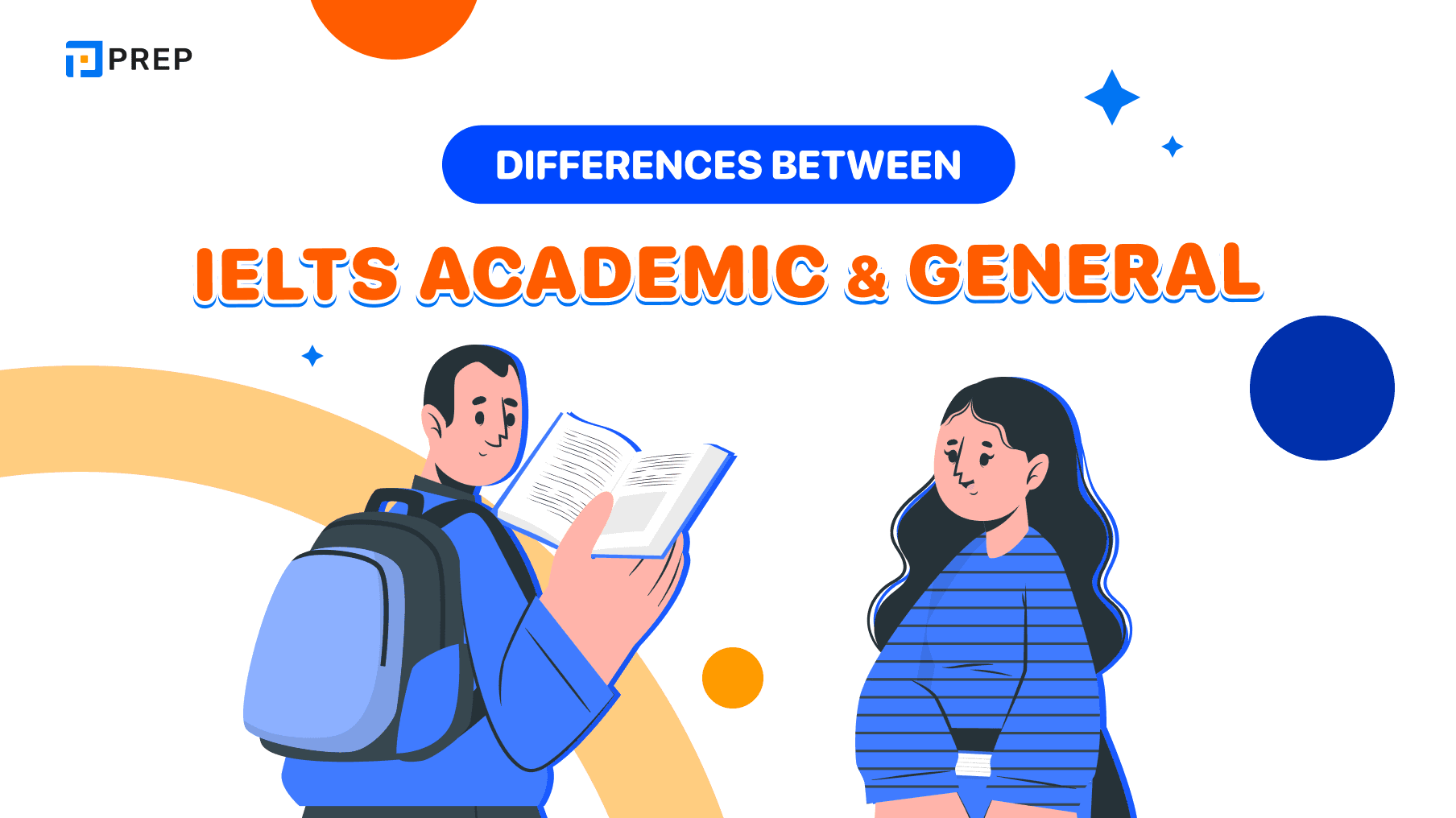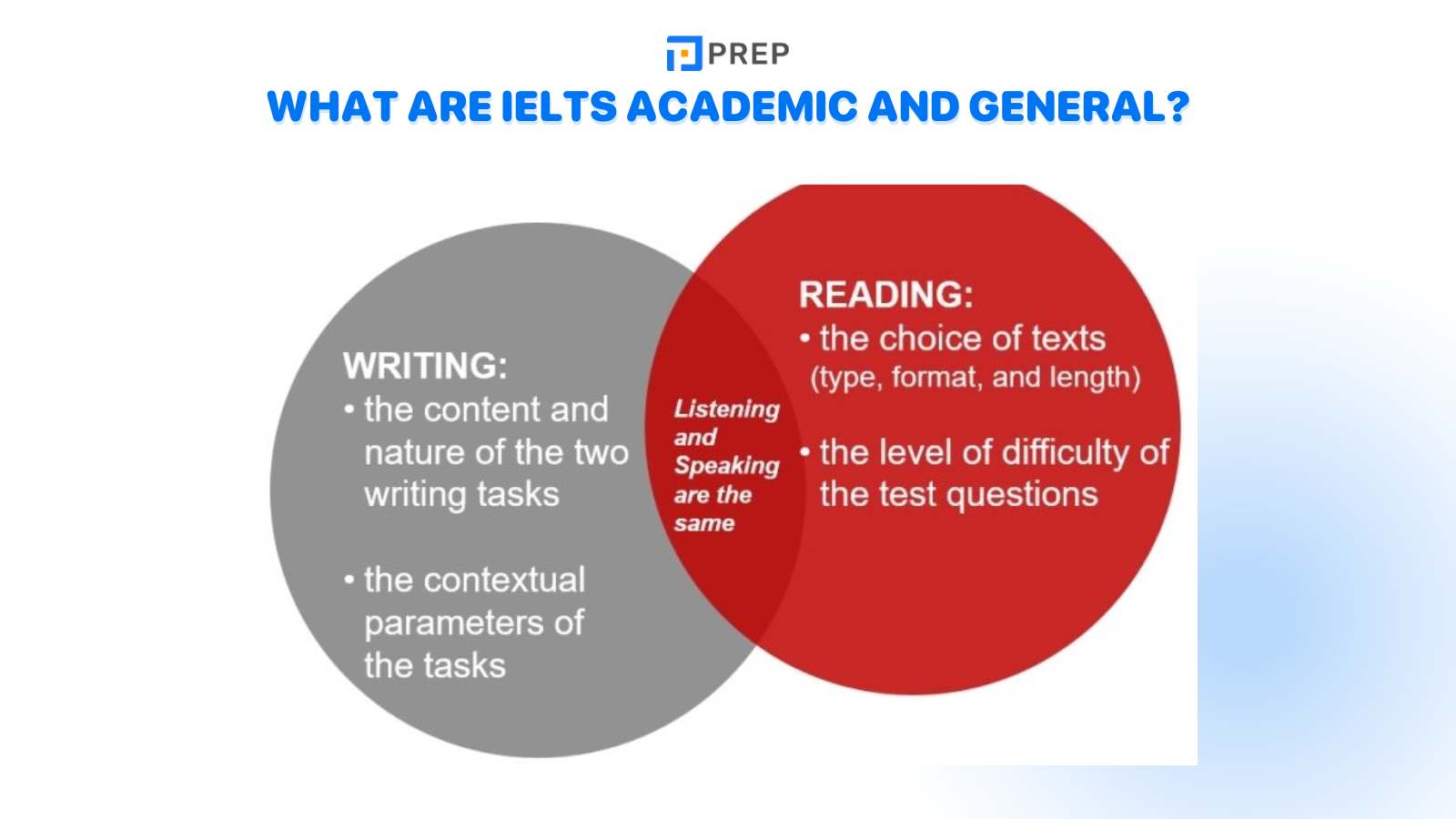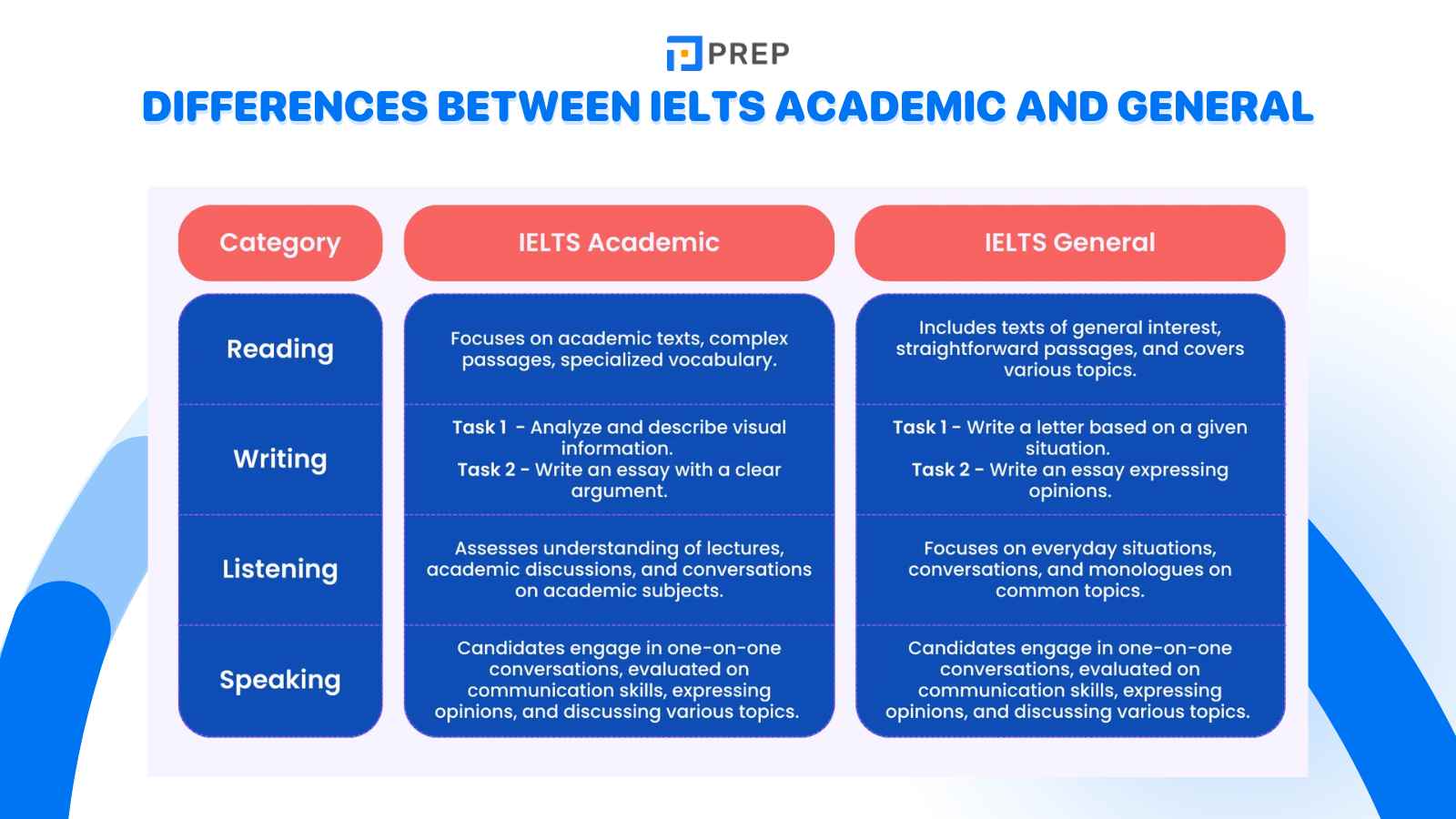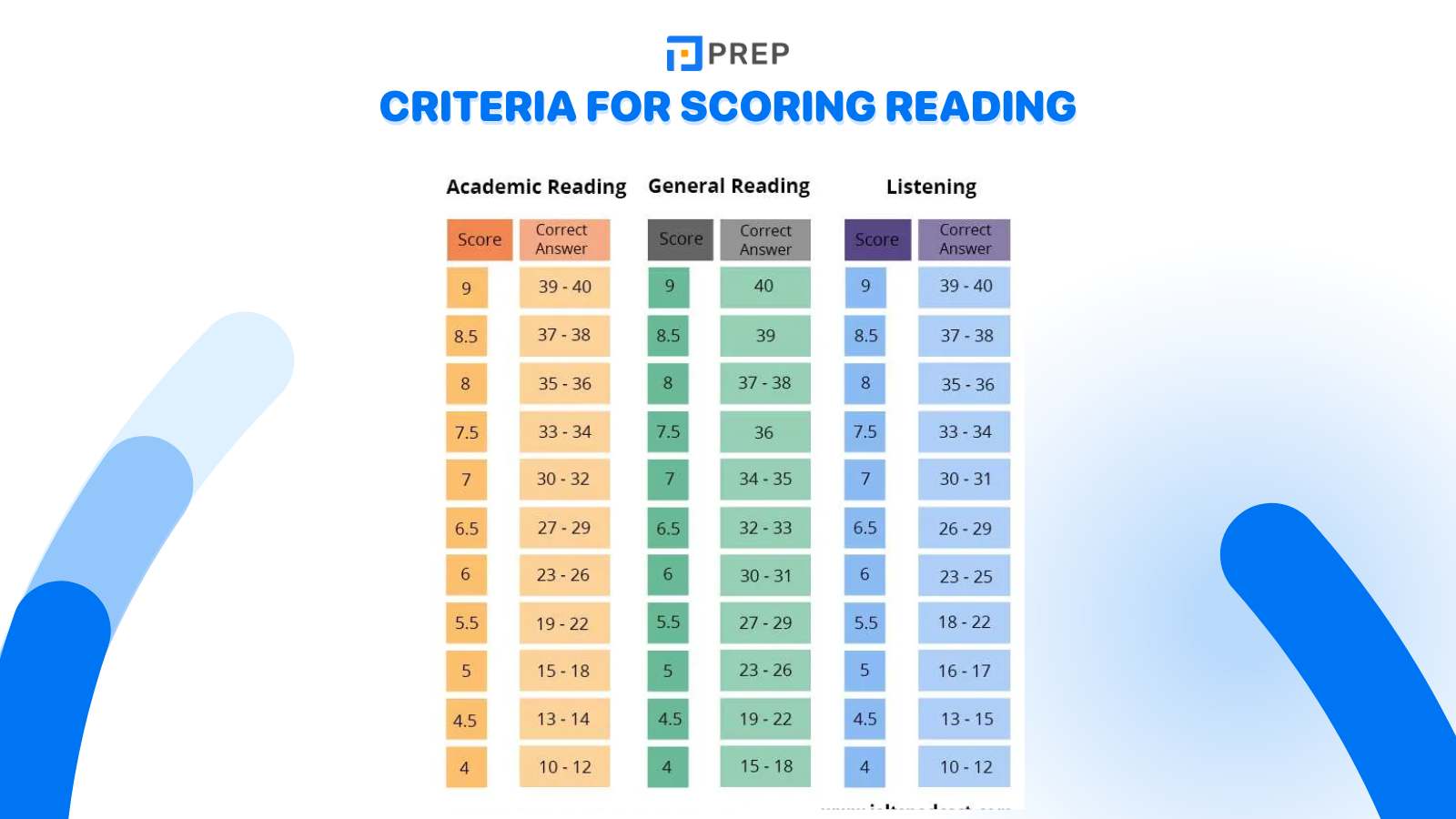Learn in detail about the differences between the two IELTS Academic and General exams
IELTS - one of the most popular international English language proficiency tests at present. The IELTS exam consists of two types: IELTS Academic and General. Therefore, many candidates wonder which type of IELTS exam they should take. To answer this question, the following article by PREP compares the details between IELTS Academic and General. Let’s read the article to choose the exam that suits you best!

I. What are IELTS Academic and General?
Are you preparing for the IELTS exam but still unsure about IELTS Academic and IELTS General? Do you not know what IELTS Academic and General are? Are you unclear about the purposes, meanings, and benefits of these two exams? Let PREP provide clear definitions of the IELTS Academic and General exams for you!
IELTS Academic is an exam designed to assess the English language proficiency of candidates who wish to study at universities or pursue higher education programs taught in English.
IELTS General is another form of the IELTS exam, which evaluates candidates' English language skills for practical, everyday use in work, training, immigration, or living in English-speaking countries.

II. Similarities between IELTS Academic and General
1. Purpose
The main purpose of both IELTS Academic and General exams is to assess candidates' language proficiency in the four fundamental skills: Listening, Speaking, Reading, and Writing.
2. Test structure
The test duration for both IELTS Academic and General is approximately 3 hours, which includes the following sections:
- Listening: 40 questions, equivalent to 40 minutes.
- Speaking: 3 parts, totaling 11-13 minutes.
- Reading: 40 questions, equivalent to 40 minutes.
- Writing: 2 essays, totaling 60 minutes.
The Listening and Speaking sections of both IELTS Academic and General exams are completely identical.
3. IELTS Listening and Speaking skills in IELTS Academic and IELTS General
3.1. IELTS Listening
In the Listening section of both the IELTS General and Academic exams, candidates will listen to 4 sections spoken by native English speakers. The listening time is 30 minutes, and in the remaining 10 minutes, candidates will answer 40 available questions (in the paper-based IELTS) on the IELTS Answer Sheet.
- Section 1: It could be a conversation between 2 people in the context of everyday social life.
- Section 2: It could be a monologue set in the context of everyday social life. For example, a speech about a school, an inauguration speech, etc.
- Section 3: It could be a conversation between a maximum of 4 people set in the context of education and training. For example, a lecturer and 1-2 students discussing a research topic.
- Section 4: It could be a monologue on an environmental topic. For example, marine pollution.
3.2. IELTS Speaking
Format: There will be one examiner and one candidate in the oral interview, which will be recorded. The speaking test has 3 parts, and each part increases in difficulty, testing the candidate's speaking ability, communication skills, expressiveness, etc.
- Part 1: This part is about introduction and short interviews. Part 1 is an introduction and tests the candidate's basic information. Next, the examiner assesses the candidate through general questions on familiar topics such as work, study and hobbies, home, family, etc.
Part 1 lasts for 4-5 minutes. Part 1 mainly tests the candidate's communication skills on everyday topics or common experiences and situations.
- Part 2: Part 2 is a long interview. The examiner will give the candidate a task card with a specific topic. The candidate needs to explain the given topic from a desired perspective. Candidates are allowed 1 minute to prepare for this part with a pen and paper to take notes.
The candidate's Part 2 speech lasts from 1-2 minutes. Afterward, the examiner will ask 1 or 2 additional questions related to the same topic. The specific time is around 3-4 minutes, including the candidate's preparation time. This part tests the candidate's ability to speak at length and continuously on a specific topic, organizing ideas, language use, vocabulary, etc.
- Part 3: In this part, the examiner and the candidate discuss issues related to the topic mentioned in Part 2. However, Part 3 will discuss the topic in a more general, abstract, and deeper way. Part 3 lasts for 4-5 minutes.
4. Certification validity
The certification validity period for both IELTS Academic and General is the same: 2 years.
III. Differences between IELTS Academic and General

1. Test Structure
The differences between IELTS Academic and General lie in the test structure of IELTS Reading and Writing. Let's explore the specific differences between IELTS Academic and General through the following comparison table:
|
Test Structure |
IELTS Academic |
IELTS General |
|
IELTS Reading |
|
|
|
IELTS Writing |
|
|
2. Criteria for scoring Reading
Because the structure of the IELTS Reading test varies, the scoring criteria for IELTS Academic and General are also different. Refer to the image below to understand the IELTS score scale for these two skills:

IV. So should we take the IELTS Academic or General?
Currently, many people want to take the IELTS, but they are unsure whether to take the Academic or General version. Therefore, whether to take the IELTS Academic or General depends entirely on each individual's own purpose. In order to make the choice of the IELTS Academic or General exam suitable and easier.
- If you take the IELTS Academic, you will focus on academic topics. In addition, academic writing skills may be beneficial for those who want to study at universities or higher education institutions, or simply for those who need to use English for job applications now or in the future.
- If you choose to take the IELTS General, you understand that the level of this exam will be easier in evaluating your ability to use English in daily life communication. IELTS General is truly suitable for candidates who have the need for immigration, living, or working in English-speaking countries such as the UK, Australia, etc.
V. Start Your IELTS Journey
The above is a detailed comparison of the two forms of the IELTS exam: Academic and General. This article has clearly discussed the similarities and differences, as well as provides some useful suggestions to answer the question of whether to take the IELTS Academic or General.If you’re striving for excellence, PREP’s customized learning solutions will help you reach your target band score.
- IELTS preparation: Unlock Your IELTS Success Story.

Hi I'm Chloe, and I am currently serving as an Product Content Administrator at Prep Education. With over five years of experience in independent online IELTS study and exam preparation, I am confident in my ability to support learners in achieving their highest possible scores.
Comment
Premium content
View allPersonalized roadmap
Most read












